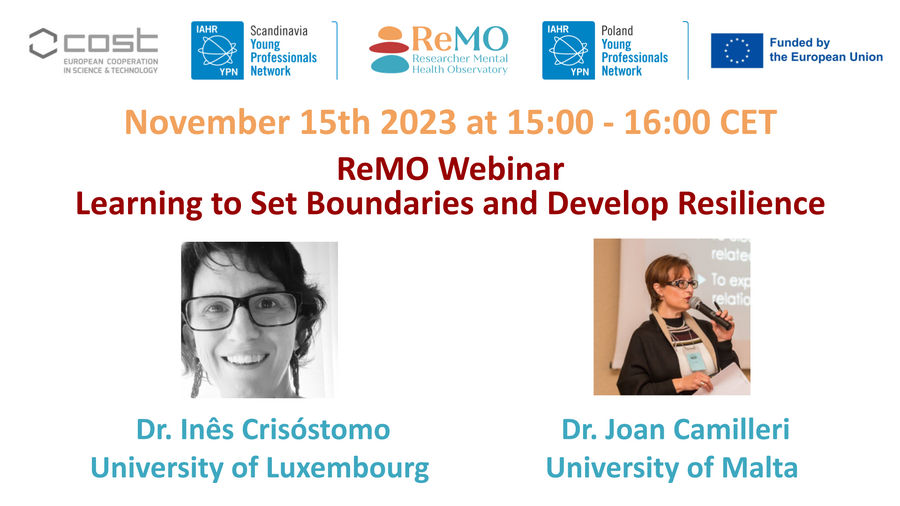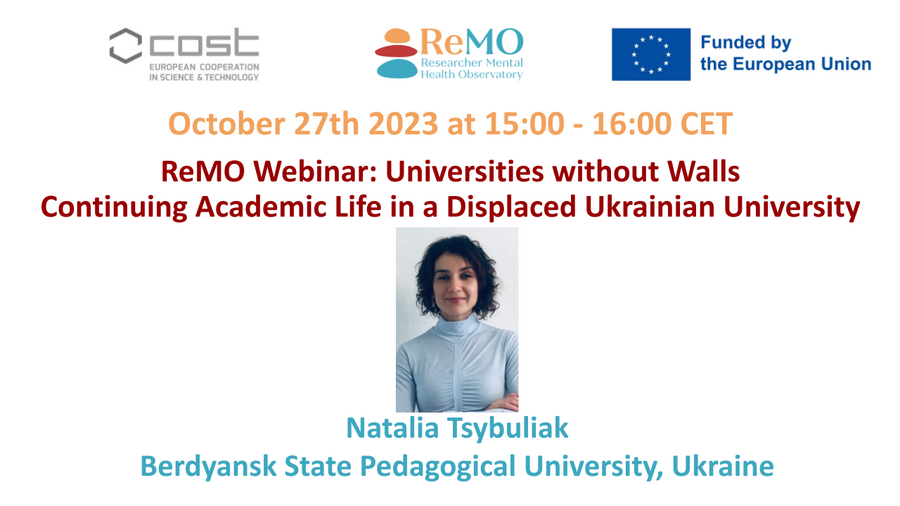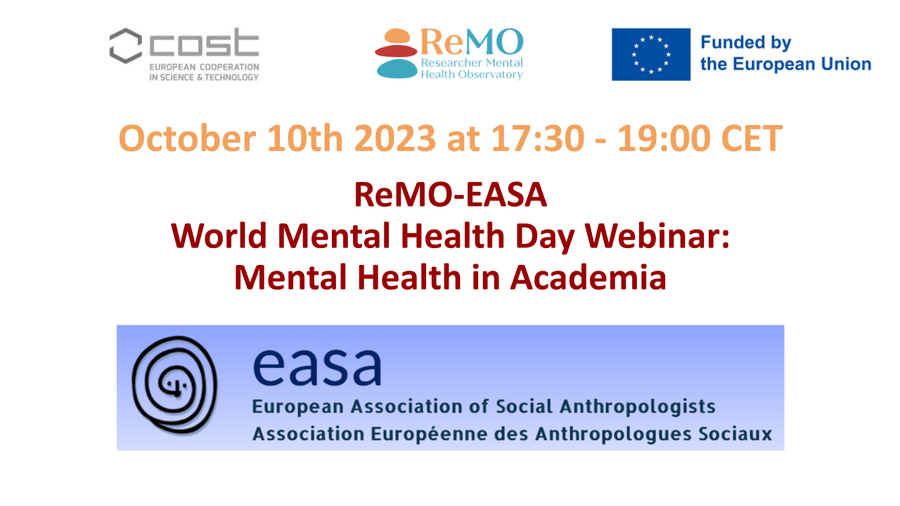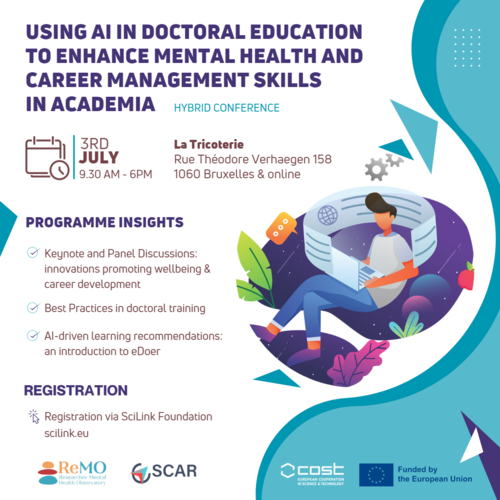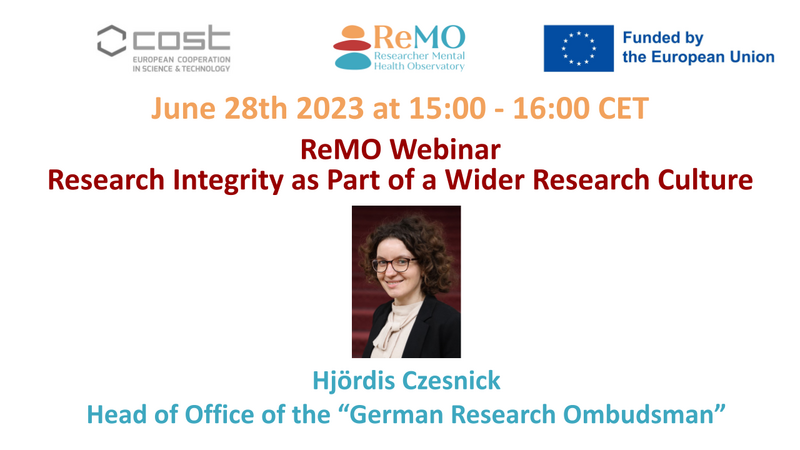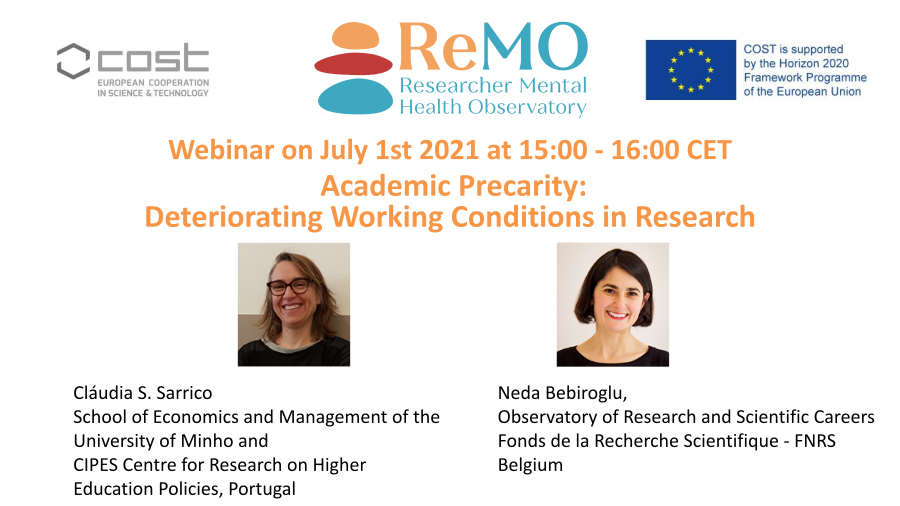Upcoming and Completed Events
ReMO COST Meeting Stakeholder Meeting
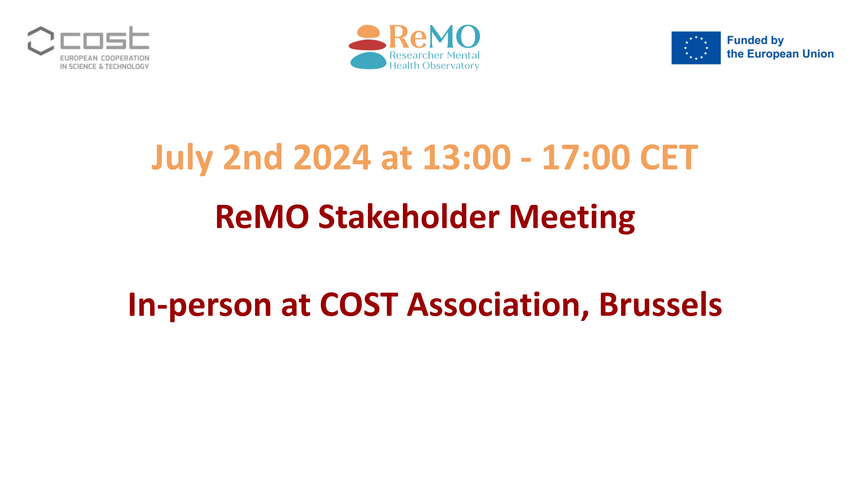
The conference aims to bridge the gap between context-specific insights for the academic environment and general insights on workplace wellbeing and mental health. We will focus on particular on innovations and tools to promote wellbeing and sustainable career development in academia, showcasing the results obtained from the “Researcher Mental Health Observatory” (ReMO) COST Action.
The ReMO COST Action focuses on the impact of institutional context, organisational structure and culture, as well as managerial practices on wellbeing and mental health within academia.
The conference will provide a platform for stakeholders from academia, policy, as well as mental health and career development professionals to share knowledge, exchange ideas, and collaborate towards developing effective and efficient prevention and action programmes for improving our academic working environment.
Programme
2nd July – Tuesday 13:00 - 17:00
12:30-13:00: Registration and Welcome
13:00-14.30: Session 1 | Summary of the Work of the ReMO COST Action
Speakers:
-
Introduction: Gabor Kismihok
-
Policy Impact: Janet Metcalfe, Brian Cahill
-
Institutional Impact - Stefan Mol
-
Community/Practitioner Level Impact - Darragh McCashin
-
Impact of Training developed with ReMO - Stéphanie Gauttier / Gábor Kismihók
-
Impact Analysis of the ReMO COST Action - Szidonia Rusu
14:30-15:00: Coffee Break
15:00-15:50: Research Assessment and Mental Health
Perspectives from researchers, institutions and policy makers
15:50-16:00: Lunch Break
16:00-17:00: Research Culture and Mental Health
Fostering a Healthy Research Culture in support of Mental Well-being in Academia
Venue
COST Association
Avenue du Boulevard – Bolwerklaan 21
1210 Brussels | Belgium
ReMO 2024: 3rd Conference of the Researcher Mental Health Observatory
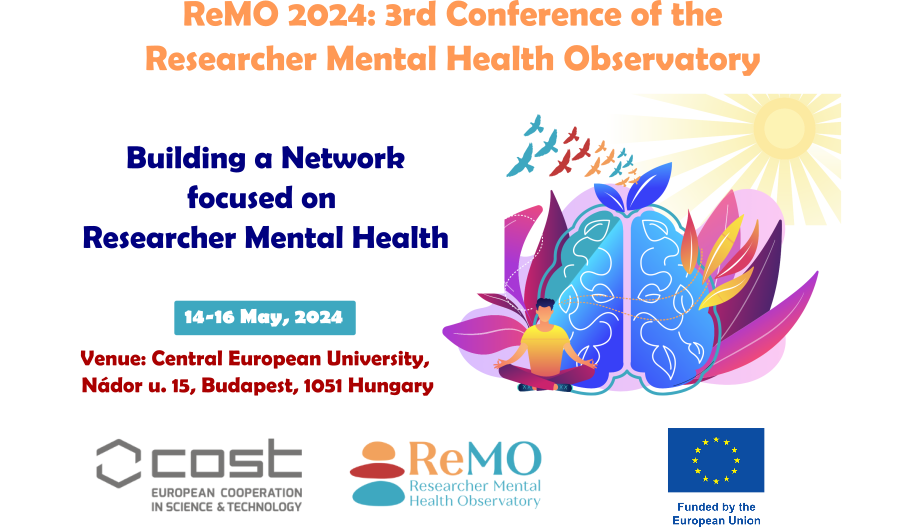
14th-16th May, 2024, Budapest, Hungary.
PROGRAMME
The Programme can be downloaded from https://projects.tib.eu/fileadmin/data/remo/docs/ReMO2024Programme.pdf
The Basic Agenda is:
Venue: Central European University, Budapest, Hungary
14th May
14:00 – 16:00 3 Parallel Workshops related to developing training based on a Problem-based Learning Approach
- Choosing and Managing your PhD supervisor
- Breaking the silence around well-being at work
- Effectuating institutional change
16:30 – 17:30 ReMO Co-Creation/Theatre Action Project
15th May
10:00 – 11:00 ReMO COST Action Progress
11:30 – 13:00 3 Parallel Session featuring ReMO Grantees
14:00 – 15:00 3 Parallel Workshop Sessions
15:30 – 17:00 ReMO Co-Creation/Theatre Action Project
16th May
10:00 – 11:00 Debate on Manifesto: What has ReMO COST Achieved?
11:30 – 13:00 3 Parallel Workshop Sessions
14:00 – 15:00 3 Parallel Session featuring ReMO Article Collection Authors
15:30 – 16:30 Final Plenaries
16:30 Finale of ReMO Co-Creation/Theatre Action Project
Followed by reception on the rooftop of the CEU building
REGISTRATION
Register for the in-person attendance at the Conference at https://scilink.eu/product/remo2024/
Register for virtual attendance at the Conference: https://us02web.zoom.us/meeting/register/tZcpdOGrpjstGNzNfKgDACdS5suX-OjZt2sW
THEME
"Building a Network focused on Researcher Mental Health"
The ReMO COST Action focuses on wellbeing and mental health within academia, a theme of strategic importance for the European Research Area and beyond. We would like to invite our fellow researchers and practitioners to critically think about reporting on Building a Network focused on Researcher Mental Health. How can stakeholders in the research environment develop interventions tackling this challenge in a rapidly changing world? We therefore hope for an inspiring conference with presentations, workshops and keynotes that will not only showcase the newest findings about the cognitive, motivational, and emotional aspects of Researcher Mental Health and Well-being, but will also be a place to discuss the global challenges that shape the present and will define the future of our research workplaces.
The conference will be a hybrid conference within the context of the ReMO COST Action with free online participation and in-person attendance at the Central European University in Budapest, Hungary.
VENUE
The ReMO 2023 Conference will take place at the Central European University, Nádor u. 15, Budapest, Hungary.
ORGANIZING COMMITTEE
- Adam Keszler, SciLink Foundation, Debrecen, Hungary
- Emese Vitae, SciLink Foundation, Budapest, Hungary
- Szidonia Rusu, SciLink Foundation, Budapest, Hungary
- Gábor Kismihók, Leibniz Information Centre for Science and Technology, Hannover, Germany.
- Brian Cahill, Leibniz Information Centre for Science and Technology, Hannover, Germany.
- Stefan T. Mol, University of Amsterdam, Amsterdam, Netherlands
REGISTRATION
Registration will open for both physical and virtual participation at a later stage.
The ReMO COST Action covers the main expenses related to the conference and there will be no charge for either physical or virtual participation. The capacity of the venue will dictate a maximum number of physical participants. There may be a charge to cover the cost of the conference dinner and other meals. Details will be made available when registration opens.
TRAVEL GRANTS
Some Travel Grants will be funded by the ReMO COST Action with priority given to ensuring the participation of:
- Speakers
- Researchers from Inclusiveness Target Countries (ITCs)
- ReMO COST Action Working Group Members
- Ensuring gender balance
- Early Career Investigators (below 40 years of age)
Learning to Set Boundaries and Develop Resilience
In the dynamic world of research, it's essential for researchers to not only drive systemic change but also to empower themselves with the tools to thrive. Join us for a transformative webinar where we'll delve into the agency of researchers to advocate for professional work practices, set healthy boundaries, and boost their resilience.
Our speakers:
Dr. Inês Crisóstomo
🌐 University of Luxembourg
👩🔬 Scientist, Mentor, and Coach
With over a decade of experience in Science Management and Scientific Training, Dr. Inês Crisóstomo leads a Mentoring Program for researchers at the University of Luxembourg. Her expertise spans international and multicultural academic environments, where she empowers individuals to solve problems, manage projects, and, most importantly, enhance their personal and professional well-being. She holds a degree in Biology from the University of Lisbon and a PhD from the Universidade Nova de Lisboa, conducted at the Rockefeller University, New York.
Dr. Joan Camilleri
🏛️ University of Malta
🧠 Head of Counselling Services
Dr. Joan Camilleri, a Doctor of Psychotherapy from the University of Middlesex, has dedicated her research to understanding the Lived Experience of Leaders during periods of Change and Transition, primarily within the healthcare sector. Her insights offer valuable guidance for anyone seeking to develop resilience in the face of professional challenges.
Join us as we explore the profound impact of setting boundaries and fostering personal growth on the journey of becoming a resilient researcher.
Date: 15th November 2023
Time: 15:00 CET
Access link: us02web.zoom.us/meeting/register/tZItdeisqzgoG9CyTuhS68XCTTa_i-3voIF8
Universities without walls: Academic Life in a University Displaced by War
Universities in the regions of Zaporizhzhia, Kherson, Donetsk and Luhansk have been forced to relocate rapidly to territories still controlled by Ukraine. For some, this was for the second time (after similar events in 2014). In this webinar, Natalia Tsybuliak of the Berdyansk State Pedagogical University will report on how these displaced Ukrainian universities have been forced to implement the without-walls concept in record time and how they continue their educational and research activities, combining synchronous and asynchronous tools to support access to laboratory and scientific equipment in other universities around the world. Natalia Tsybuliak is an associate professor in the Department of Applied Psychology and Speech Therapy at the Faculty of Preschool, Special, and Social Education at Berdyansk State Pedagogical University, Ukraine. She specializes in researching the values of teaching and learning in higher education institutions during times of crisis, providing psychological support to participants in the educational process at higher education institutions, and studying the impact of the full-scale war in Ukraine on different groups of people. She is a member of the editorial team for the journals “Insight: Psychological Dimensions of Society” and “Scientific Bulletin of Kherson State University. Series: Psychological Sciences.”
Tsybuliak, N., Suchikova, Y., Shevchenko, L. et al. Burnout dynamic among Ukrainian academic staff during the war. Sci Rep 13, 17975 (2023). https://doi.org/10.1038/s41598-023-45229-6
Suchikova, Y. and Tsybuliak, N., Universities without walls: global trend v. Ukraine’s reality. Nature 614, 413 (2023). https://doi.org/10.1038/d41586-023-00380-y
ReMO-EASA World Mental Health Day Webinar: Mental Health in Academia
To mark World Mental Health Day 2023, the ReMO COST Action on Researcher Mental Health and the European Association of Social Anthropologists (EASA) held a webinar to raise awareness on mental health in academia. ReMO is a EU-funded initiative that is building a network that advocates for healthy and sustainable working conditions in academia. In this webinar, two members of ReMO, Brian Cahill and Luisa Solms, presented ReMO and their activities, including ongoing initiatives such as the STAIRCASE survey that aims to understand the impact of working conditions on mental health and well-being in academia. Two anthropologists, members of EASA and PrecAnthro, Mariya Ivancheva and Alexandra Oancă, also took part in the discussions.
In this webinar, we discussed the ways in which universities, networks, and professional associations such as EASA could address mental wellbeing going forward. What are the institutional tools at the disposal of EASA and ReMO to pursue an anti-precarity agenda that is attuned to understanding mental health struggles and improving mental wellbeing?The webinar was open to all anthropologists and researchers who aim to raise awareness of mental health issues and to mobilize efforts in support of mental wellbeing in anthropology, professional associations, and generally in academia.Speakers
Dr. Brian Cahill, grant manager of the Researcher Mental Health Observatory (ReMO) at Leibniz Information Centre for Science and TechnologyDr. Brian Cahill works in the Learning and Skills Analytics Lab of the Leibniz Information Centre for Science and Technology (TIB) in Hannover as Grant Manager of the COST Action CA19117 on Researcher Mental Health Observatory (ReMO). He serves as a Member of the Governing Board of EuroScience, a Member of the Board of Directors of the SciLink Foundation and served as Chair of the Marie Curie Alumni Association from 2016 to 2018. In these roles, he engaged with early-career researchers on topics ranging from researcher career development, innovation, research funding, science communication, science policy, pension literacy, research integrity, responsible research and innovation and many more.
Dr. Mariya Ivancheva, Senior Lecturer at the University of Strathclyde, Glasgow and PrecAnthro co-founder. Dr. Mariya Ivancheva is an anthropologist and sociologist of higher education and labour. Her academic and research-driven advocacy work focus on the casualisation and digitalisation of academic labour, the re/production of intersectional inequalities at universities and high-skilled labour markets, and the role of academic and student communities in broader processes of social change especially in transitions to/from socialism. She is the author of multiple peer-reviewed and book chapters, op-ed and policy reports, and has recently published the monograph The Alternative University: Lessons from Bolivarian Venezuela (Stanford University Press, 2023).
Luisa Solms, PhD Candidate at the University of Amsterdam, Co-host of the podcast PhD Unplugged, and ReMO memberLuisa Solms is a PhD Candidate at the department of Work and Organizational Psychology at the University of Amsterdam. She was also a visiting PhD student at the University of Melbourne, Department of Management and Marketing. She is a board member of the pHResh network for PhD students in the fields of Human Resource Management and Organisational Behavior and a member of the Researcher Mental Health Observatory (ReMO). Together with her sister Lara Solms, she co-hosts the podcast PhD Unplugged. In PhD Unplugged, PhD students talk to professional coaches about PhD-specific struggles and how to overcome them. The well-being and career experiences of PhD students are central themes in Luisa’s research.
Dr. Alexandra Oancă, Postdoctoral Associate at the KU Leuven, Vice-president of EASA, and PrecAnthro member. Dr. Alexandra Oancă is a Postdoctoral Associate at the Department of Social and Cultural Anthropology at the KU Leuven, Belgium, and is currently serving as the Vice-president of the EASA Executive Committee. Her research analyses discourses of expertise, and knowledge production in bureaucracies and policy networks. As a longstanding member of PrecAnthro and current member of the EASA board, Alexandra is interested in strengthening EASA's work on the theme of mental health and putting mental health and its relations to academic precarity on the agenda of the European anthropological community.
ReMO Webinar: European Commission's Recommendation for the new Charter for Researchers
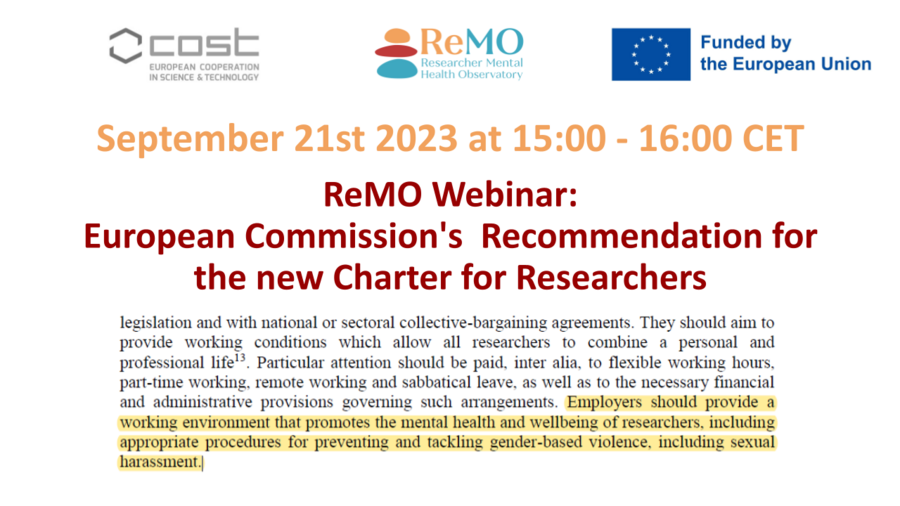
In this webinar, Michele Rosa-Clot of the European Commission will present the main features of the recently published recommendation for the Charter for Researchers. This Charter will replace the Charter and Code that was originally published in 2005. The Charter for Researchers aims to revitalize the European Research Area and to inspire European researchers, research employers, funders and policy makers. The Charter is a set of principles underpinning the development of attractive research careers to support excellence in research and innovation across Europe. The focus of the Charter for Researchers is the rights and responsibilities of researchers, employers, funders and policy makers consisting of 20 key principles. The ReMO COST Action is very pleased to read that among many changes, the new Charter explicitly prioritises the mental health and wellbeing of researchers: “Employers should provide a working environment that promotes the mental health and wellbeing of researchers, including appropriate procedures for preventing and tackling gender-based violence, including sexual harassment.”
Prof. Renaud Jolivet, will present his experience of representing researchers on the ERA Forum and how the European Commission integrates the views of stakeholders into its policy-making processes.
Dr Michele Rosa-Clot is Portfolio Manager of the Human Resources Strategy for Researchers (HRS4R) at the Directorate-General for Research and Innovation of the European Commission. He had responsibility for managing the process that led to the new Charter for Researchers. He received his PhD in History and Political Science from the University of Pisa in 2007 and previously studied in Italy, the USA and the UK.
Professor Renaud Jolivet is Full Professor at the Maastricht Centre for Systems Biology, and Chair of Neural Engineering & Computation at Maastricht University. He additionally holds a courtesy appointment at CERN, the particle physics laboratory. He has worked in Switzerland, Japan, the Netherlands, and the UK. His work focusses on the brain’s heterocellularity and on neurotechnologies to interface with brain tissue. Over the last decade, Prof. Jolivet has also been active in science policy at the European level, first within various working groups of the MCAA, before being elected to the board of the Association for one term (2018-2020). Since January 2022, he is the representative for individual researchers and innovators at the European Commission’s ERA Forum, where he was nominated by ISE, MCAA, EuroDoc, EuroScience, and the Association of ERC Grantees. There, he brings the voice of researchers to the table where the future of European science policy is crafted.
Launch of STAIRCASE Survey on Sustainable Working Conditions in Academia
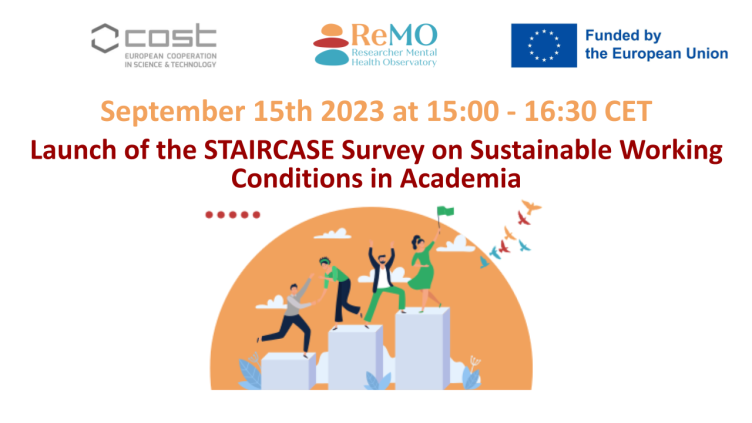
Join us for the official launch event of the STAIRCASE Survey on on Sustainable Working Conditions in Academia.
The STAIRCASE survey aims to understand working conditions' impact on mental health and well-being in academia, enabling evidence-based recommendations for impactful change. It is part of the EU-funded Researcher Mental Health Observatory (ReMO), a COST Action that is building a network that advocates for healthy and sustainable working conditions in academia.
The STAIRCASE Survey is a unique and transformative initiative in both its pan-European outreach and bottom-up driven approach. Your participation is needed to ensure a proper representation of your country and institutions.
Active engagement of as many researchers as possible will significantly enhance data collection and in turn enable tailored recommendations specific to your context. Take this opportunity to become part of a movement towards shaping a brighter future for all researchers out there.
Looking forward to seeing you at our launch event!
Using AI in Doctoral Education to Enhance Mental Health and Career Management Skills in Academia
Brussels Stakeholder Meeting - Hybrid Conference
The conference aims to bridge the gap between context-specific insights for the academic environment and general insights on workplace wellbeing and mental health. We will focus on particular on innovations and tools to promote wellbeing and sustainable career development in academia, showcasing the results obtained from two projects: the “Researcher Mental Health Observatory” (ReMO) COST Action, and the “Online, open learning recommendations and mentoring towards Sustainable research CAReers” (OSCAR) Erasmus Plus project.
The ReMO COST Action focuses on the impact of institutional context, organisational structure and culture, as well as managerial practices on wellbeing and mental health within academia. The OSCAR project on the other hand offers a personalised training and online mentoring service for researchers to support their career management, mental health awareness and wider professional skills development.
The conference will provide a platform for stakeholders from academia, policy, as well as mental health and career development professionals to share knowledge, exchange ideas, and collaborate towards developing effective and efficient prevention and action programmes for improving our academic working environment.
Registration
To register for this event,
- in-person registration at SciLink Foundation
- virtual registration for Zoom Link
Programme
9:30-10:00: Registration and Welcome
10:00-11:30:
- Opening Remarks
- Keynote Speech: The importance of promoting wellbeing and sustainable career development in academia.
- ReMO: Insights and innovations on promoting wellbeing and mental health in academia. Panel discussion and Q&A with experts in the field.
11:30-11:45: Coffee Break
11:45-13:00: Best practices in doctoral training and how to integrate digital learning solutions in academia: perspectives from researchers, institutions and policy makers.
13:00-14:00: Lunch Break
14:00-15:30:
- Introduction to eDoer: Showcasing the possibilities offered by learning recommender systems
- Lessons learned - input from all OSCAR partners. Personalised training and online mentoring for career management and mental health awareness skills development.
15:30-15:45: Coffee Break
15:45-17:00:
- AI-driven learning recommendations and online mentoring to support sustainable researcher careers. Panel discussion and Q&A with researchers and stakeholders.
- Reflections on the way forward for promoting wellbeing and sustainable career development in academia.
- Closing remarks
17:00-18:00: Networking Reception
Further information on speakers will be shared soon.
Venue
The conference is planned as a hybrid event with free online participation and in-person attendance at La Tricoterie in Brussels, Belgium.
La Tricoterie
Rue Théodore Verhaegen 158
1060 Brussels
For further information on La Tricoterie visit https://www.tricoterie.be/fr/
ReMO Webinar: Research Integrity as Part of a Wider Research Culture
This webinar will explain the role of ombudspersons in research and the national ombuds committee called “German Research Ombudsman”. The responsibility of research institutions to create a climate that complies with research integrity guidelines will be explored. Recent developments in the area of ombuds work and whistleblower protection in research will be addressed. Hjördis Czesnick is Head of Office of the “German Research Ombudsman” Committee. She is also active in the European Network of Research Integrity Offices.
2nd Conference of the Researcher Mental Health Observatory (ReMO 2023)
Evidence-Based Interventions for Fostering Healthy Academic Workplaces
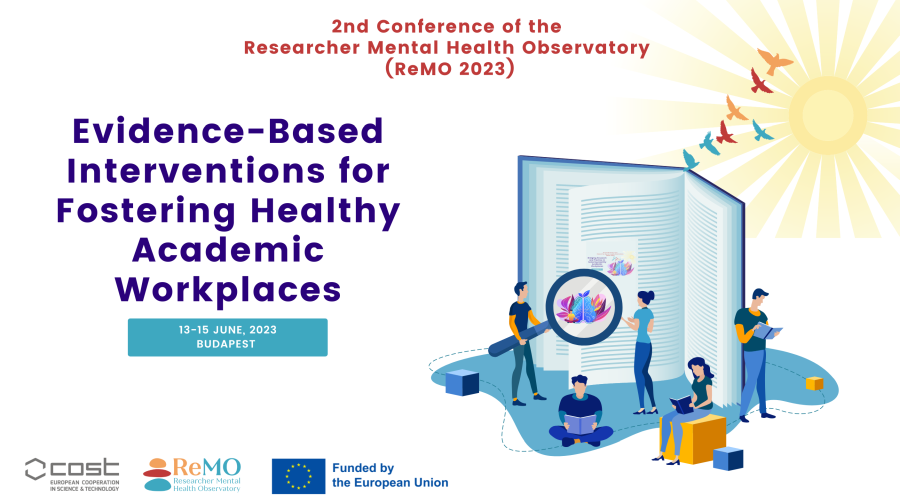
13th-15th June, 2023, Budapest, Hungary.
PROGRAMME
The draft programme of the ReMO 2023 Conference can be downloaded here.
REGISTRATION
Register for virtual attendance at the Conference: https://us02web.zoom.us/meeting/register/tZIvde6oqj4pHd2paBZGQPlPtLBIho8W11OD
Register for the in-person attendance at the Conference at https://scilink.eu/product/remo2023/
THEME
"Evidence-Based Interventions for Fostering Healthy Academic Workplaces"
The ReMO COST Action focuses on wellbeing and mental health within academia, a theme of strategic importance for the European Research Area and beyond. We would like to invite our fellow researchers and practitioners to critically think about reporting on Evidence-Based Interventions for Fostering Healthy Academic Workplaces. How can stakeholders in the research environment develop interventions tackling this challenge in a rapidly changing world? We therefore hope for an inspiring conference with presentations, workshops and keynotes that will not only showcase the newest findings about the cognitive, motivational, and emotional aspects of Researcher Mental Health and Well-being, but will also be a place to discuss the global challenges that shape the present and will define the future of our research workplaces.
The conference will be a hybrid conference within the context of the ReMO COST Action with free online participation and in-person attendance at the Central European University in Budapest, Hungary.
ReMO Webinar: Promoting a Healthy Lab Culture at the University of Toronto
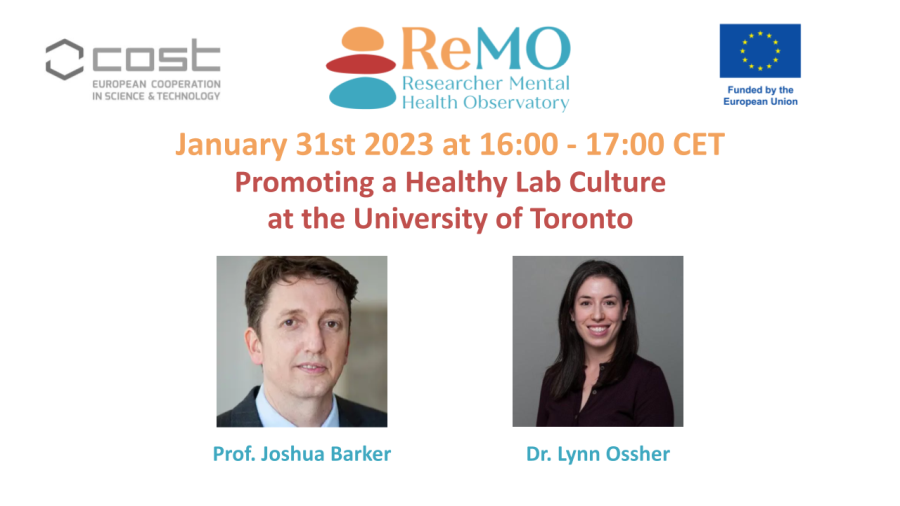
Register in advance for this webinar: https://us02web.zoom.us/meeting/register/tZwrdeqrqjwtGNUQ-6XDwqjCy5ClnYWCSwI_
The University of Toronto is the leading research-intensive university in Canada. Through setting up the Healthy Labs and Research Teams initiative, the University of Toronto recognizes the vital importance of healthy laboratory environments for researcher success, and for the quality of research that stems from our laboratories. The Healthy Labs and Research Teams initiative was set up with three main aims:
- Identifying and celebrating global and local best practices in lab management
- Developing a Healthy Lab ‘Charter’, which individual laboratories at the University could adopt
- Outlining a strategy for delivering Healthy Lab educational programming to researchers
The initiative was developed through a series of consultations with key stakeholders on local best practices and challenges within the University of Toronto lab ecosystem, including graduate students, postdoctoral fellows, lab assistants, faculty members, chairs, and senior administrators. The initiative calls for a cultural shift from considering graduate students and post-doctoral fellows strictly as employees working on their supervisor’s project to scholars and mentees enrolled in training programs where research training is central but includes time for course work, teaching, professional development and personal life, all within an open, supportive, collaborative, and healthy lab environment that recognizes wellness and equity, diversity, and inclusion as core values.
In this presentation, Dr. Barker and Dr. Ossher will describe the Healthy Labs and Research Teams program and outline the lessons learned during the program’s development and its initial stages of implementation.
Joshua Barker is Vice-Provost, Graduate Research and Education, and Dean of the School of Graduate Studies at the University of Toronto. Previously, he served as Vice-Dean Graduate Education in the Faculty of Arts & Science, Director of the Asian Institute at the Munk School of Global Affairs, and Acting Chair of the Department of Anthropology. Dr. Barker is a cultural anthropologist whose research focuses on urban Indonesia and science and technology studies.
Lynn Ossher is the Projects Officer, Graduate Research & Program Culture at the School of Graduate Studies at the University of Toronto. She previously worked at the University of Oxford in the Motor Neuron Disease Centre and the Nuffield Department of Clinical Neurosciences in research management roles, focusing on research operations, research policy, governance, and strategic initiatives.
1st Conference of the Researcher Mental Health Observatory (ReMO 2022)
25th-26th August, 2022, Budapest
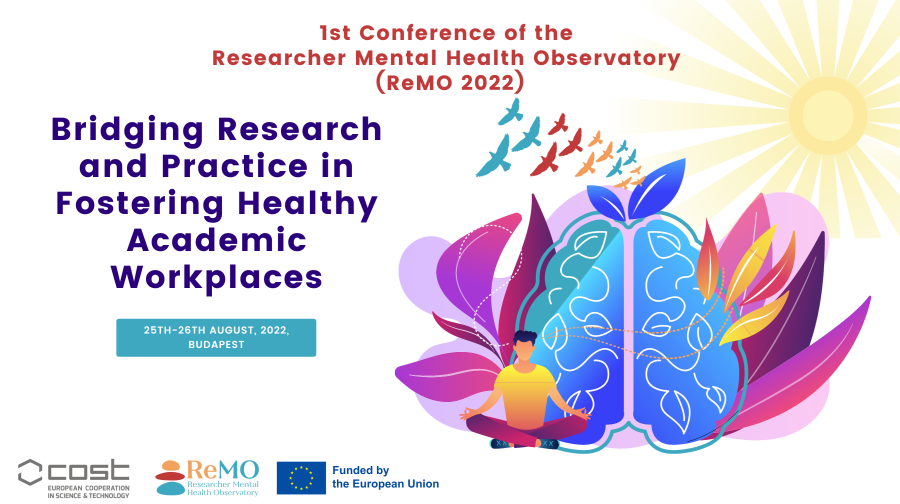
THEME
"Bridging Research and Practice in Fostering Healthy Academic Workplaces"
The ReMO COST Action focuses on wellbeing and mental health within academia, a theme of strategic importance for the European Research Area and beyond. We would like to invite our fellow researchers and practitioners to critically think about Bridging Research and Practice in Fostering Healthy Academic Workplaces. How can stakeholders in the research environment contribute to tackling this challenge in a rapidly changing world? We therefore hope for an inspiring conference with presentations, workshops and keynotes that will not only showcase the newest findings about the cognitive, motivational, and emotional aspects of Researcher Mental Health and Well-being, but will also be a place to discuss the global challenges that shape the present and will define the future of our research workplaces.
The conference will be a hybrid conference within the content of the ReMO COST Action with free online participation and in-person attendance at the Central European University in Budapest, Hungary.
For more information about the conference, click here: https://projects.tib.eu/remo/remo-2022-conference/.
Being an Ambassador for Researcher Wellbeing
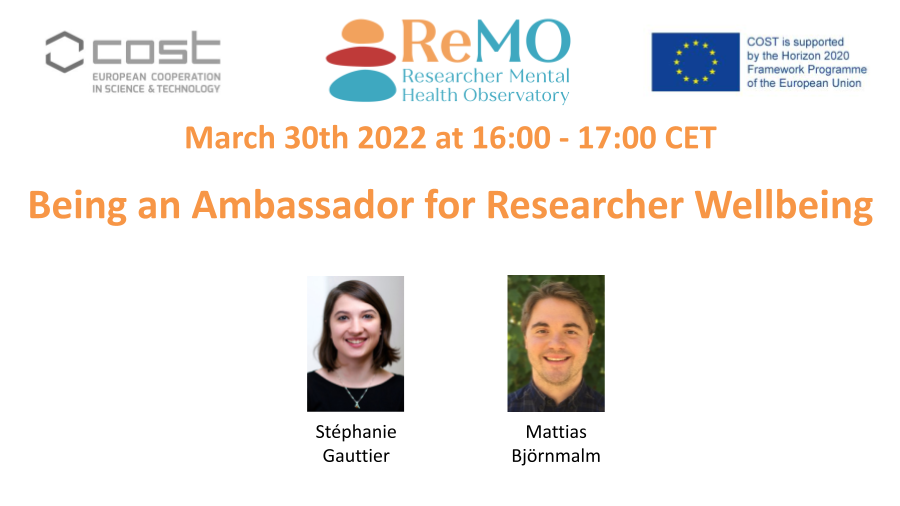
This webinar will launch a call for participation in the ReMO Ambassador Programme: Becoming an ambassador for wellbeing in academia. The Webinar will describe our vision for the ReMO Ambassador Programme, who should take part, the training and network-building that the programme will provide and give an overview of what is expected of ReMO Ambassadors. The webinar will also provide the viewpoint of a researcher, who became a passionate advocate for mental health in academia during his postdoctoral studies and is now Deputy Secretary General of CESAER, an alliance of European universities of science and technology. This unique viewpoint will provide the ReMO Network with insight into how evidence-based advocacy can lead to systemic change within research institutions and our wider research culture.
Dr. Stéphanie Gauttier is Vice Chair of the ReMO COST Action and Assistant Professor at Grenoble Ecole de Management doing research at the intersection of information systems, human-computer interaction, and ethics. Stéphanie Gauttier specializes in qualitative methods, especially Q method. Stéphanie received her PhD in Information Systems Management from the University of Nantes. She has a masters in Political Sciences and a masters in Communication Sciences, and over five years of experience in the marketing industry. As a result, her research crosses disciplines and was applied to consumers (PhD), learners (EDUWORKS), and more recently to the healthcare domain (Responsible-Industry and GLASNOST). She was awarded an individual Marie Curie fellowship in 2018, was nominated on the list of 400 women in the NL across all industries in the "bright mind" category in 2018, and received the Brenner award for her work in Q-methodology in 2019. Stéphanie worked for over 5 years for the Publicis group in Russia before embarking on an academic career.
Dr. Mattias Björnmalm is an experienced scientist & policy professional. He is the Deputy Secretary General of CESAER. His other engagements include as an Honorary Research Fellow at the Bionics Institute and as an invited member of the World Economic Forum Expert Network. Previously, he led the research project qBionano at Imperial College London, was an Editor in science & policy for the journal Angle, and was Vice-Chair of Policy for the Marie Curie Alumni Association. In 2018, he was interviewed by Nature about how research culture lies at the core of many scientists’ mental-health issues and how evidence-based advocacy can lead to systemic change. Mattias led a workshop session at the 2018 Vitae Conference on "Healthy and supportive environments for PhD candidates: paving the way for good practices". In 2019, he was awarded an Imperial College London President's Award: “recognized for outstanding achievements in policy engagement“.
Mental Health First Aid in Academia
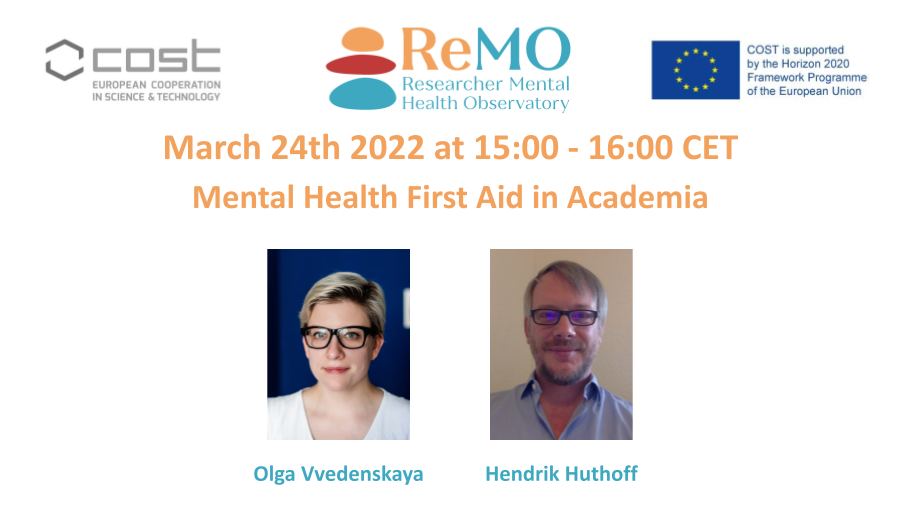
This webinar will present an overview of Mental Health First Aid programmes within universities. Hendrik Huthoff and Olga Vvedenskaya will discuss what they have learned from their experience of setting up Mental Health First Aid programmes and answer questions from the ReMO network.
Dr. Hendrik Huthoff is the Head of Education at the Jena School for Microbial Communication at the Friedrich Schiller University where he is responsible for the training program of doctoral and post-doctoral researchers. During his chemistry studies and his PhD research, he developed a severe anxiety disorder that had a major impact on his life despite finding ways of successfully completing his scientific work. Nowadays, he is active as a mental health advocate to improve provisions at institutes of higher education and to highlight that mental health problems can be solved with the right kind of support. In 2021, he set up the first Mental Health First Aid team at a German University.
Dr. Olga Vvedenskaya was born in Moscow, Russia. She studied medicine specializing in medical biophysics in Moscow and worked on her MD thesis devoted to traumatic brain injury and mass spectrometry in the University of Pittsburgh, USA. She further did her PhD in Berlin, Germany working on multi-omics approach to research of liver cancer and pre-cancerous conditions. She continued her work in translational medicine and mass spectrometry in Dresden, working as a postdoc in MPI-CBG. Olga is an advocate for academic mental health through cofounding Dragonfly Mental Health, where she is CAO.
Researchers and the War in Ukraine
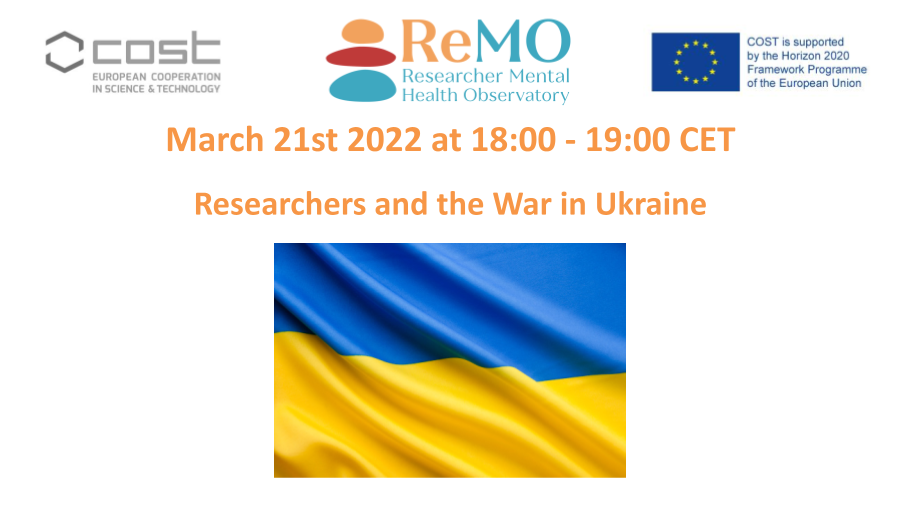
This Webinar gives a voice to Ukrainian researchers affected by the Russian Federation’s acts of violence and aggression against the people of Ukraine.
Representatives of the Council of Young Scientists of Ukraine, Olesia Vashchuk and Oleksandr Berezko, will report on how the war affects higher education in Ukraine, their lives and careers and the effect on the mental health of the Ukrainian people. The Council of Young Scientists of Ukraine has worked with Eurodoc to secure the practical support of European researchers for Ukrainian Early Career Researchers. We will also speak with a psychiatrist, who is actively working with hospitals in Kyiv to treat patients and family members traumatized by the war and direct acts of violence against them. Finally, the webinar will feature Oleksandra Ivashchenko of Science for Ukraine, who will make an overview of the effort of those outside Ukraine to support Ukrainian researchers and how the members of our ReMO COST Action Network can help out.
Evidence-base with regard to Researcher Mental Health
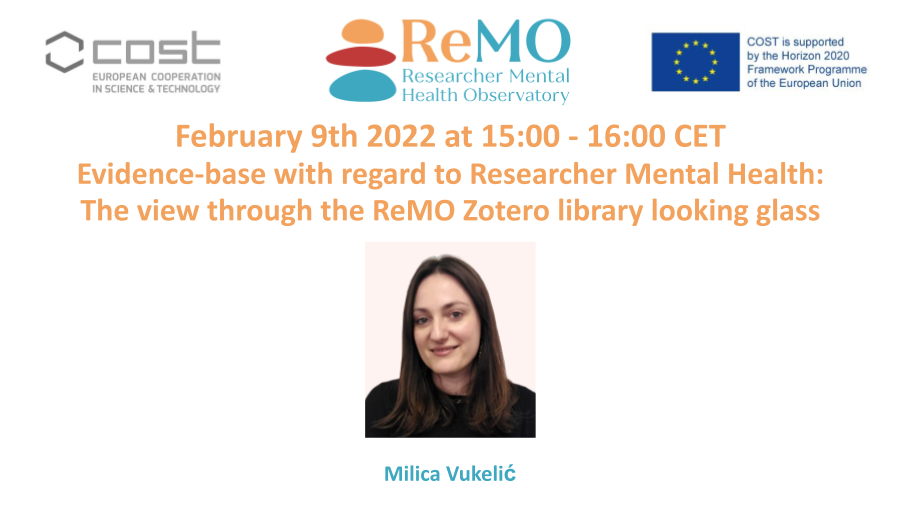
One of the main aims of ReMO COST action is to develop a conceptual framework and tools that are tailored for both academics and other relevant stakeholders (practitioners, research managers, policy makers, and wider audience). ReMO takes a multilevel (research, practitioner, management and policy) perspective on researcher mental health and problem generating mechanisms. To these ends, the ReMO network has created an Evidence Hub (https://www.zotero.org/groups/2521493/researcher_mental_health/library) that collects much of the extant literature and evidence concerning researcher mental health. This webinar describes work performed in the framework of a ReMO virtual mobility grant to develop a strategy for managing the Evidence Hub through categorizing and extending the collection. This webinar will facilitate knowledge transfer within the network with regard to research gaps that the ReMO nework is well placed to address.
Milica Vukelić is an assistant professor at the Department оf Psychology, Faculty of Philosophy, University of Belgrade, Serbia. Milica received her doctoral degree in psychology from the Department of Psychology, Faculty of Philosophy, University of Belgrade in 2015. She has more than 10 years of experience in university teaching, research, and HR consulting (for various national and international companies). Her main topics of interest are work and organisational psychology, career development, workplace bullying and stress, work engagement and wellbeing. Milica has published more than 50 research papers and served as a reviewer for many national and international journals. Currently, Milica is a member of ReMO COST Action CA19117, and a member of Future of Work and Organizational Psychology (FOWOP) collective. She was a researcher and consultant on many international and national research projects funded by UNDP, UNICEF, World Bank, ILO, WUS Austria, IFRC, GIZ, and the Ministry of Education and Science, Republic of Serbia.
Well-being of a Young Researcher - Virtual Seminar for Researchers
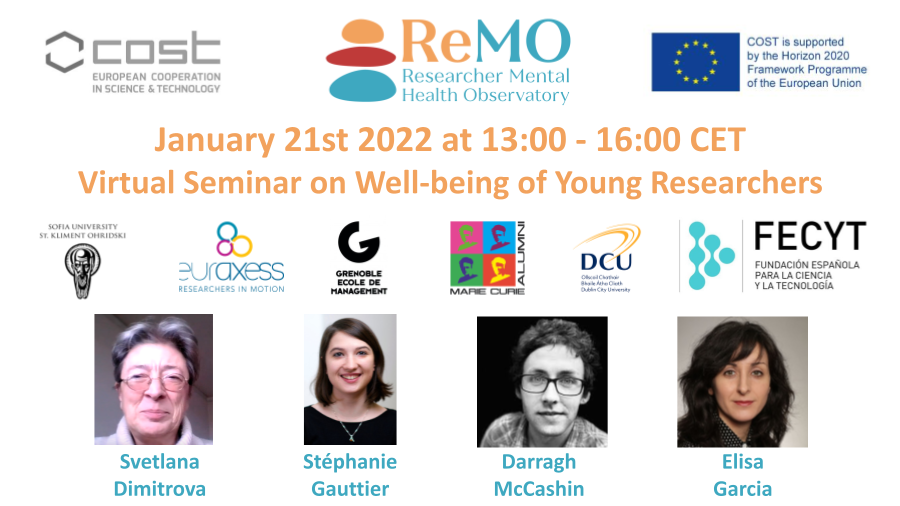
The EURAXESS Network and REMO COST Action join efforts to provide young researchers with some recent information, tips, techniques and advices on how to keep their work and private life in balance. This seminar will help researchers to identify and deal with difficult situations in their work environment.
Mentoring has emerged as a practical way for supporting the well-being and integration of early-career researchers. This online workshop is based on the experience gained by the speakers in creating mentoring programmes:
- Marie Curie Alumni Association Referent Programme for Peer-to-Peer Mentoring
- EURAXESS Mentoring Programme “Shape the future of a Researcher coming to Europe”
- EURAXESS REsearchers BEyond aCAdemia Mentoring Programme (REBECA)
13.00 - Opening
13.15 - 14.30 - Part I
14.30 - 15.00 - Coffee Break
15.00 - 16.00 - Part II
Please register at: https://www.euraxess.bg/bulgaria/events/well-being-young-researcher-virtual-seminar-researchers
OEduverse: Creating a Better Research Environment
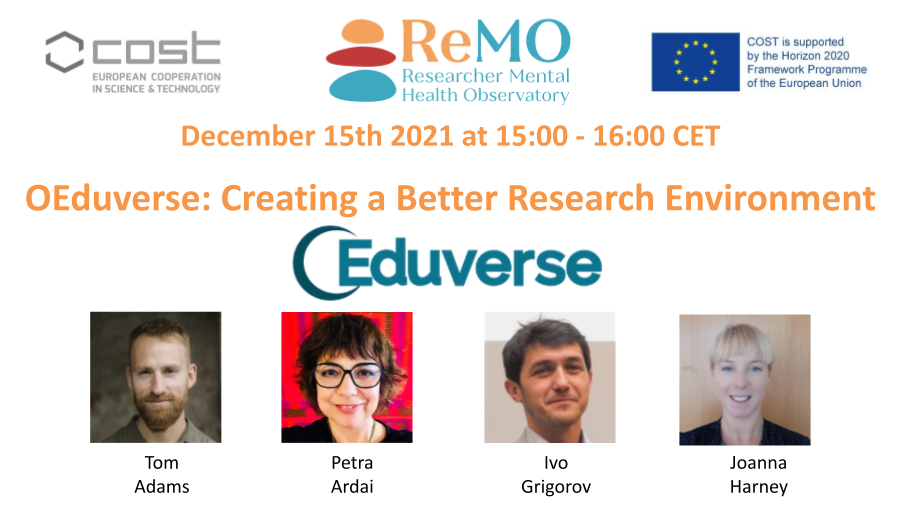
This webinar will be hosted on Zoom. Register here: https://us02web.zoom.us/meeting/register/tZAvcu2spjMjEtOD0QByNAUytKj3GwrAoMbi
In today’s growing competitive landscape in research careers, it has become more important than ever to advance the skills needed for a sustainable career in research. Researchers need to be experts in research management, aware of the diversity in groups and disciplines, and manage stress in order to have a long, successful career. Importantly, researchers also need to be able to engage broader audiences, being confident, capable communicators. OEduverse presents a roadmap for research environments by focusing on Mental Well-being, Open Science and Communication & Immersive Storytelling. This webinar features experts on these topics.
This webinar features the following representatives of Oeduverse:
Jo Harney is a Counselling Psychologist in the position of Training and Groups Manager at the Student Counselling Service in Trinity College Dublin, Ireland. She specialises in working with students supporting them to achieve mental wellbeing to reach their potential during their academic careers.
Tom Adams is a Psychotherapist and the Postgraduate Liaison at the Student Counselling Service at Trinity College, Dublin. Tom's professional interests include Compassion Focussed-Therapy, dreamwork, and Jungian-oriented psychotherapy.
Ivo Grigorov holds a PhD in Marine Science, currently provides support across the research grants lifecycle at the National Institute of Aquatic Resources (DTU-Aqua). Personal interests focus on Open Science and optimising strategies for societal impact of research projects.
Petra Ardai is theatre-maker, teacher of performance studies and scenario writer. She is the artistic director of the Amsterdam and Budapest based art collective SPACE. Petra has wide experience in immersive storytelling in various media.
The Oeduverse Winter School takes place online from Jan 10-14, 2022. Register here: https://oeduverse.eu/events/oeduverse-winter-school/
Training Workshop: How to ensure mental health and well-being for researchers
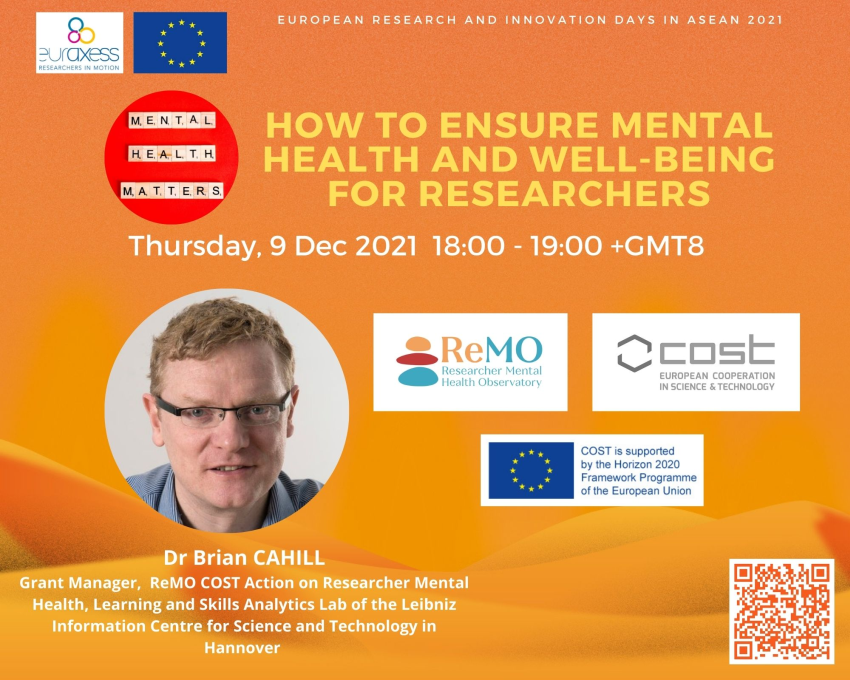
On Thursday 9th December at 11:00 CET, Brian Cahill will talk about "How to Ensure Mental Health and Well-being for Researchers" as part of the EURAXESS ASEAN European Research And Innovation Days ASEAN 2021. Register here: https://euconf-eu.zoom.us/webinar/register/WN_T_yPUBNpQJWNjaBo_eopuw
Organisational misconduct in academia and whistle-blowers' mental health
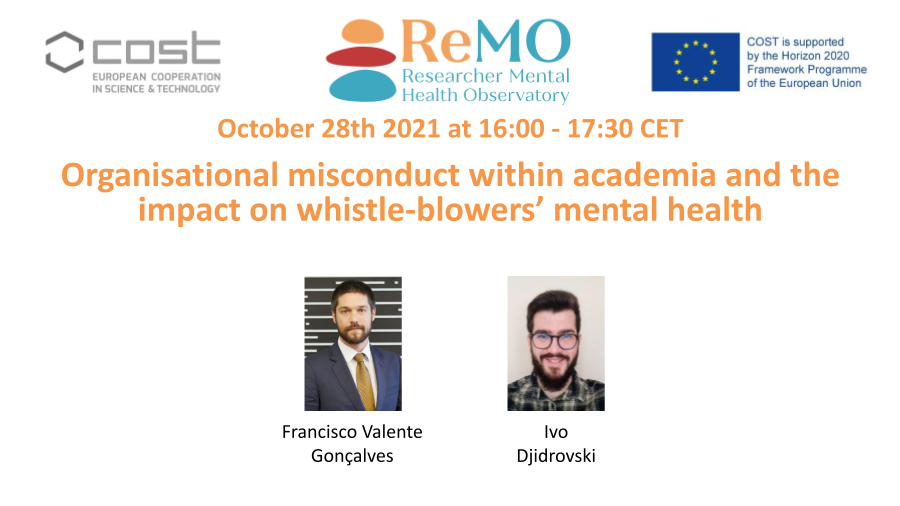
Whistleblowing is reporting any type of irregularity found within an organization, which could harm the organization itself, its employees and/or society. Individuals within an organisation may fear negative consequences: hence organisations should focus their human and technological resources on investigating tips from reporting lines. This session explores this topic by presenting some research on the implementation of whistleblowing channels within academia. Results suggest that some universities still ignore the need for reporting misconduct, allowing fraud or harassment to be obscured and damaging researchers' wellbeing. The discussion will assess how to facilitate whistleblowing within academic settings.
Speaker:
Dr Francisco Valente Gonçalves is a certified clinical and forensic psychologist, currently working within the Forensic & Integrity Services team at EY, where he works on topics related to Integrity, Compliance and Behavioural Ethics on a corporate level as well as detecting deception within fraud investigations. Francisco co-founded RUMO.Solutions, a platform for online therapy that currently serves individuals and organisations in +15 countries. Francisco was awarded the Best Practices Award 2021 (Portuguese Body of Psychologists), 2020 Top 3 European Young Researcher Award (EuroScience), 2019 Social Impact Award (Marie Curie Alumni Association) and the 2018 Bridging Career Gaps Award (MSCA). Francisco has promoted well-being within the research community through the MCAA Annual Meetings Workshops, EuroScience Open Forum, ReMO COST Action and OSCAR (Erasmus+).
Ivo Djidrovski is an inventor with bachelors and masters from Lyon University. During his PhD (MSCA-ITN in3 project) at Newcastle University and Newells Biotech, he successfully patented an iPSC derived airway model and presented his work in the UK parliament (STEM for Britain). His research focuses on developing in-vitro models from iPSCs for use in toxicology and drug discovery.
Mental health challenges and ethical dilemmas - approaches to dealing with uncomfortable situations
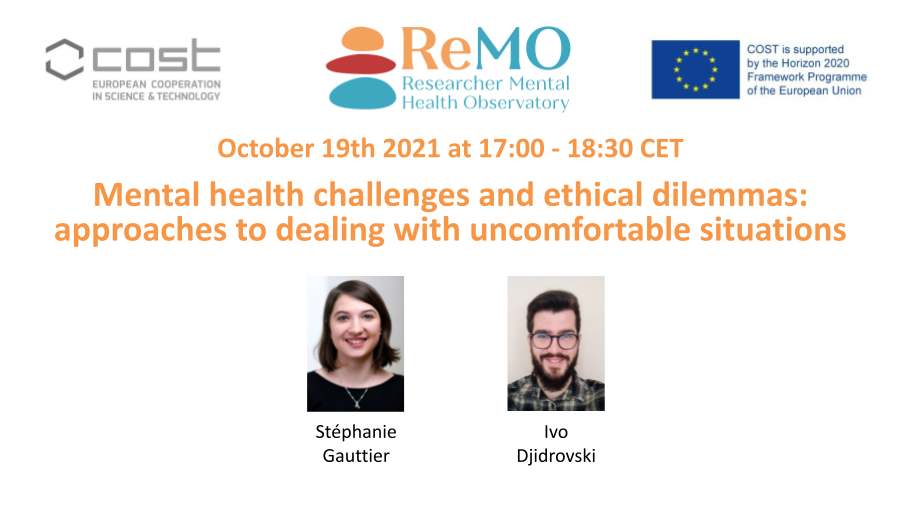
The COST Action on Researcher Mental Health (ReMO) invites you to the webinar hosted by Stéphanie Gauttier and Ivo Djidrovski on Tuesday 19th October from 17:00-18:30 CET.
Some researchers experience working environments where power imbalances, supervision struggles or breaches of research integrity are unfortunately present. Coping with such situations can cause numerous mental health issues, including depression, imposter syndrome or work related stress. During the webinar, we will reflect on these challenges and offer some tools that can help individuals to gain clarity on how to approach these situations.
EARLI 2021 Conference Abstract: Doctoral education during the pandemic and beyond: challenges and strategies
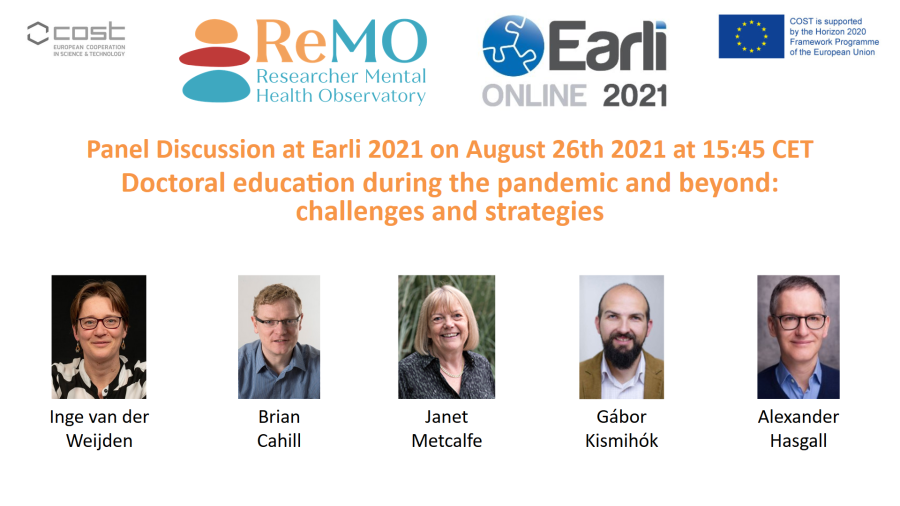
EARLI 2021 Conference, Thursday 26th August, 15:45 – 16:45 CET
Type of Session: Panel Discussion
Chair: Brian Cahill
Speakers:
- Janet Metcalfe of Vitae
- Inge van der Weijden of Center for Science and Technology Studies of Leiden University
- Gábor Kismihók of Learning and Skills Analytics Group of Leibniz Information Centre for Science and Technology University Library
- Alexander Hasgall of European Universities Association Council on Doctoral Education
Abstract:
This session will discuss how the COVID-19 pandemic has affected early-career researchers and what lessons can be learned for doctoral education and training with a special focus on doctoral programmes in educational research related areas. Since the introduction of lockdowns throughout Europe during March 2020, many researchers have been forced to modify, restrict or reduce their research activity. Home working may suit some researchers but research work often depends on access to laboratories, research infrastructure, field work and archives. For those with parental responsibilities, the lockdown was accompanied by a closure of schools and childcare that reduced the time available to work from home. International researchers have experienced greater isolation. In particular, we will highlight issues related to the mental wellbeing of PhD candidates and discuss survey data showing how the crisis has exacerbated mental health issues among early-career researchers. This session will present and discuss strategies and practices from and for doctoral programs, including shifting PhD supervision, evaluation and promotions online, provision of online doctoral training, improving digital communication in doctoral supervision, securing doctoral funding extensions and handling restrictions in international mobility.
Extended Summary:
The COVID pandemic has had a huge impact on our societies and universities since March 2020. Doctoral candidates are the most junior level of academic researchers and have been more exposed to insecurity during the pandemic.
This session will depart from the currently available evidence of pitfalls in doctoral education and assessing the prevalence of mental health issues among early-career researchers before the pandemic. Often those most affected are those, who experience inequality, such as, younger researchers, female researchers, international researchers and those with caring responsibilities. The session will discuss the evidence of the prevalence of mental health issues among doctoral candidates, how COVID-19 exacerbated such mental health issues and discuss the effectiveness of interventions.
There will be a discussion of how existing EARLI research sheds light on a particular theme, or by considering new lines of research that need to be pursued.
During the session we will cover 4 important viewpoints:
1. Pre-Pandemic Assessment of Researcher Wellbeing. The emergence of lower levels of mental health among researchers predates the COVID pandemic. Inge van der Weijden is a leading researcher on the motivation, selection and evaluation of researchers in order to better understand their career development and to provide insight to policymakers and institutional stakeholders on higher education policy. She co-authored the report, The Mental Well-Being of Leiden University PhD Candidates, that proposed concrete measures for institutions to support the mental health of early-career researchers by:
- appointing independent psychologist for PhD candidates,
- establishing a supervision team for international PhD candidates,
- providing career coaching for both non-academic and academic careers,
- providing supervisor training for both new and experienced supervisors,
- providing transparency with regard to the requirements PhD candidates must meet,
- supporting independent PhD mentoring groups,
- frequently monitoring of the well-being of PhD candidates and
- evaluating chosen interventions.
2. Impact of COVID-19 Crisis on Researcher Wellbeing. We will examine the impact of the COVID-19 crisis on the research work, mental wellbeing and social connection of early-career researchers and research staff as evidenced by Janet Metcalfe’s work as part of the SMARTEN/VITAE survey. This survey examined changes to employment outside of academia, living arrangements, caring arrangements and support by supervisors and by universities. The survey found that inequalities in research were a clear predictor of being more impacted by the COVID pandemic with females, caregivers, researchers with a physical disability or long-term illness and international researchers being more likely to be struggling with their mental wellbeing.
3. Digitization of the research environment. Although conferences, physical training courses and university lectures have been greatly restricted, there has been a strong increase in the uptake of digital transferable skills training during the last 12 months. Personalization of researcher training is not a novel discussion, however, the current COVID situation put this issue - together with the digitization of research environments - into the spotlight as well. Gábor Kismihók will contribute to the discussion from the point of view of learning and skills analytics, and showcase how to support early-career researchers in improving their career perspectives by assessing their skills gaps and recommending personalized training opportunities.
4. Institutional Adoption. Doctoral Programmes have adapted their programmes to meet the demands of COVID and the EUA Council of Doctoral Education has played a strong role supporting universities to make changes that will support the mental wellbeing of doctoral candidates. In particular, the EUA-CDE worked with European doctoral programmes in providing guidance and examples of good practice in response to the COVID-19 pandemic with regard to:
- Online assessment and doctoral dissertation defence
- Online skills training and supervision
- Supporting doctoral candidates' mental health and well-being
- The effect of the pandemic on collaborations and funding of doctoral education
In the aftermath of the impact of the COVID-19 pandemic on the mental wellbeing of doctoral candidates, this session suggests actions and practices that institutions can take not just to respond to this crisis but to improve the outcomes of doctoral education in general
ReMO Webinar on July 1st 2021 at 15:00 CET - Academic Precarity: Deteriorating Working Conditions in Research
Register in advance for this meeting:
https://us02web.zoom.us/meeting/register/tZYvcuqhrzouGdZoyfNwt9DGYlCJVF2c1Rjx
After registering, you will receive a confirmation email containing information about joining the meeting.
The recently published report of the Expert Group for the OECD Global Science Forum on "Reducing the precarity of research careers” had a particular focus on postdoctoral researchers holding fixed-term positions without permanent or continuous employment prospects. This webinar features the manager of the project and a member of the Expert Group. Cláudia Sarrico will discuss the main findings and insights that can be drawn from the evidence base assembled by the project and the main challenges faced by the research precariate. Neda Bebiroglu will present the main recommendations of the report and suggested policy options: to improve working conditions and professional development, better link funding to human resource policies, make governance more inclusive, promote equal opportunities and diversity, improve human resource management, promote inter-sectoral and international mobility, and develop the evidence base on research careers.
Prof. Cláudia S. Sarrico is Professor of Management at the School of Economics and Management of the University of Minho, and senior researcher at CIPES Centre for Research on Higher Education Policies, Portugal. She led the project on Reducing the Precarity of Research Careers at the Global Science Forum of the OECD. She served as advisor to the Board of the Portuguese Research Funding Council (FCT) and the Agency for Assessment and Accreditation of Higher Education (A3ES). She has a PhD in Industrial and Business Studies from Warwick Business School.
Neda Bebiroglu, Ph.D. is scientific advisor and coordinator at the Observatory of Research and Scientific Careers at the Fonds de la Recherche Scientifique - FNRS in Belgium, a structure that aims to track and analyse the careers of researchers and develop knowledge on the doctoral and postdoctoral process. She is a member of the Expert Group for the OECD Global Science Forum on "Reducing precarity of research careers”. Neda holds a Master's degree in Applied Psychology from New York University, New York (USA) and a Ph.D. in Child Study and Human Development from Tufts University, Massachusetts (USA). After completing postdoctoral fellowships at King's College London (UK) and Université catholique de Louvain (Belgium), Neda joined the Observatory of Research and Scientific Careers in 2018. She is currently responsible for two main projects: the “Future of PhD Holders”, which targets the job transition of doctorate holders in the French community of Belgium and “Recruiting Talents” that is designed to evaluate the added-value of the doctorate degree for non-academic employers.
ReMO Webinar on May 26th 2021 at 15:00 CET: Influence of the Built Environment and your Work Space on Mental Well Being
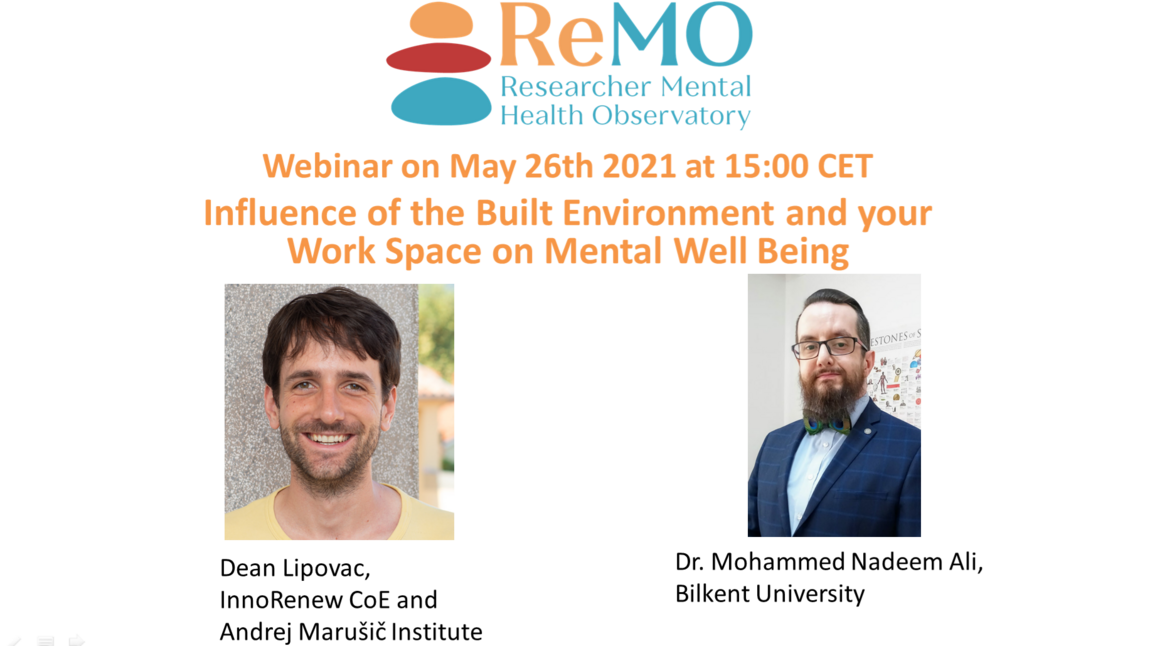
Register in advance for this meeting:
https://us02web.zoom.us/meeting/register/tZIodO2sqD8qE9K23xGDNyHI_mc_fKRDoCYz
After registering, you will receive a confirmation email containing information about joining the meeting.
Speakers
Dean Lipovac completed a master’s degree in applied psychology at the Faculty of Mathematics, Natural Sciences and Information Technologies, University of Primorska, in Koper, Slovenia. He is a PhD student and an assistant researcher at the InnoRenew CoE and Andrej Marušič Institute. His work is focused on researching the effects of the built environment on mental health. He investigates how different materials used in indoor design influence physiological, emotional, and cognitive indicators of well-being. His long-term aspiration is to help create indoor environments that encourage a healthy mind and a healthy body.
Dr. Mohamad Nadim Adi is an assistant professor at Bilkent University, Dr. Adi completed his doctoral studies in the field of virtual reality and obtained his undergraduate degree and Master’s in architecture from the UK. Combining these two fields, he developed a passion to understand and test new buildings and building materials using virtual reality. Dr. Adi has studied how people respond to different types of built environments using virtual platforms as a medium. He worked in several universities around the globe, in the fields of high-rise wood buildings, hospital design, dementia and elderly friendly design, and interactive architecture. He is currently looking into how different environments can affect the mental health of its occupants. His research has several potential inter-disciplinary applications involving health, education, and ergonomics. His work on dementia friendly hospital design resulted in changes to the Canadian building code and several publications and talks in various events globally. Dr. Adi was the first elected chair of ICoRSA where he led the GRIPP (Grounding Responsible Research and Innovation Practices) and RRING (Responsible Research and Innovation Networking Globally) projects in partnership with UNESCO and the EU. He also served as the Chair of the Canadian Association of Postdoctoral Scholars (CAPS).
Webinar on May 12th 2021 at 15:00 CET: How to win support for the Well-Being of Early-Career Researchers

The N² network represents around 16000 doctoral candidates working in research institutes throughout Germany, mainly from the Max Planck Society, Leibniz Association and Helmholtz Association. In 2019, N² initiated a harmonized survey questionnaire which was sent to doctoral researchers in all four member organisations. The aim was to be able to compare the results between the organisations and increase their significance. The survey reports of the three full member networks of N2 can be found here. This webinar will discuss to what extent an evidence base was effective in influencing the policies of the research institutions with regard to power abuse, doctoral supervision, salary levels and provision of mental health support.
Register in advance for this meeting:
https://us02web.zoom.us/meeting/register/tZYtcOCtqjkuE9BSS0-qTxboUEU5Xbjg9EMr
After registering, you will receive a confirmation email containing information about joining the meeting.
Speakers
Jana Lasser is a member of the advisory board of N² - the network of doctoral researcher networks in Germany and management committee member of the ReMO COST action for Austria. The mental health of doctoral researchers was a major part of her agenda, when she served as the spokesperson of the Max Planck PhDnet and member of the board of N² in 2018. Next to these activities, Jana is a PostDoc in the Computational Social Science Lab at TU Graz, conducting research in the areas of digital health and misinformation spread.
Vanessa Borges Pires is an associate board member of N² - the network of doctoral researcher networks in Germany and a Student Representative of the International PhD Program (IPP) in Mainz. Vanessa is a Doctoral Researcher at Prof. Dr. Brian Luke’s Lab in the Institute for Molecular Biology/Johannes Gutenberg University Mainz where she is studying RNA-DNA hybrids in Telomere Biology in S. cerevisiae.
Mental Well-being of Leiden University PhD candidates
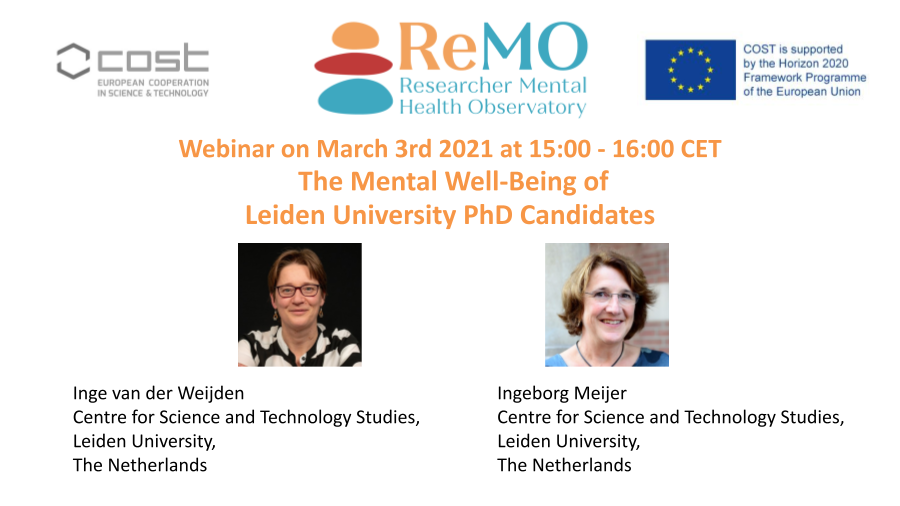
The Researcher Mental Health COST Action will hold a webinar featuring Inge van der Weijden and Ingeborg Meijer on Wednesday 3rd March at 11:00 CET. The webinar will discuss their report on The mental well-being of Leiden University PhD candidates.

The ReMO COST Action on Researcher Mental Health is funded by the COST Association with support from the Horizon Europe Framework Programme of the EU under the project number CA19117.
COST (European Cooperation in Science and Technology) is a funding agency for research and innovation networks. Our Actions help connect research initiatives across Europe and enable scientists to grow their ideas by sharing them with their peers. This boosts their research, career and innovation.


